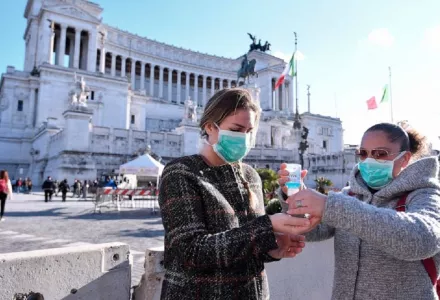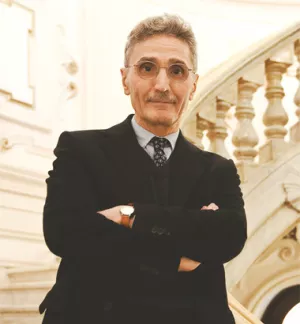
Published in Il Sole 24 Ore and translated into English by the author.
It couldn’t have been any other way. The pandemic is forcing the European Union (EU) and its member states to address the economic and social consequences for them. And yet, the pandemic has accelerated transformation processes of the international system which will impact the ability of the EU and its members states to manage those consequences. If it is true that the single market in Europe has been able to grow under the conditions of a multilateral international system that hinges on the transatlantic alliance, the uncertainty about that system will reduce the single market’s potential, especially once the pandemic is over. The replacement of multilateralism with conflict between the great powers has highlighted the structural weakness of the EU, that of being an economic powerhouse but a political dwarf. If the transatlantic alliance (NATO) and the United States (USA) are increasingly unable to provide guarantees for Europe, how can we (Europeans) guarantee our economic and social security, as well as our system of values?
Let’s start with the USA. The latter continues to be the sole global power in existence. Forecasts of its decline have proven overstated (as argued by Ruchir Sharma and Mick Cox). Rather than the decline of the USA, we have seen the rise of other great powers (China, in particular), which has led to the redefinition of international power relations. The pandemic has accelerated the formation of a system of great powers (so defined by Graham Allison) in which no one is capable of imposing themselves on the others, but in which no one wants to collaborate with the others (because of the lack, as argued by Richard Haas, of “somebody leading by example”). External conflict has indeed become the condition for generating internal consensus. Look at the USA. President Trump has sought to radicalise the clash with China, not only because the latter is responsible for the spread of the pandemic, but also because he needs to find a lightning-rod for the economic difficulties created by the pandemic (in the last week over 40 million Americans have requested unemployment benefit, at the end of 2020 the federal deficit will be 18.7 per cent of GDP and federal debt will exceed the size of the national economy). But China is not the only enemy for Trump. In a tweet a few days ago, the President threatened to withdraw more than 9,000 US troops from Germany as a reaction to Angela Merkel’s refusal to take part in person at a G-7 meeting in Washington D.C. (even if no official decision has been taken so far). Of course, Joe Biden could replace Donald Trump in November. But the die hasn’t been cast yet. Joe Biden is leading the national polls, but Donald Trump is still competitive in the electoral colleges of the states (such as Ohio, Wisconsin, Pennsylvania, Michigan and Florida) where the presidential election will be decided. In addition, nationalistic tendencies will continue to be felt in the Senate, the key institution for foreign and defence policy. However it goes, there is no doubt that the transatlantic alliance must be defended but also radically rethought (as Nick Burns has proposed).
Let’s turn to the EU. Its main leaders seem to be aware of the changes that have occurred. On 27 May, in the Bundestag, Angela Merkel acknowledged that “the pandemic has radically changed many things” forcing the EU to act “as a responsible force not only internally, but also externally…The pandemic is a stress test for European foreign and security policy.” In an article in April 2020, Josep Borrell, the head of European diplomacy, argued that the EU learned that it must “protect itself collectively.” In an interview with the Financial Times on 17 April, Emmanuel Macron noted that “we are at a moment of truth, which is to decide whether the European Union is a political project or just a market project.” Nonetheless, no choices seem to follow as a consequence of such declarations. Indeed, to address the pandemic, we are seeing pressure to cut the resources planned (in the multi-annual budget for 2021-2027) for the European Defence Fund (EDF), as well as for more limited programs such as Military Mobility or the European Medical Command. With the UK leaving, French leadership has often spoken of equipping the EU with “strategic autonomy”, but has stopped short of proposing to share France’s seat on the UN Security Council with the EU. France is asking Germany to share fiscal risks, but is reluctant to share its military resources. Even if Commissioner Thierry Breton is working to develop the technological and industrial bases of European military policy and defence, without which the EU would be unable to acquire operational autonomy, the pandemic has opened divisions between states which make it difficult for them to cooperate. Of course, Trump’s re-election would force the EU to overcome these divisions, but this would take place in a worsened and hostile international system. Trump’s defeat would interrupt the nationalistic tendency in the USA, but at the same time it would reduce the drive for the EU to equip itself with military and operational autonomy. A paradox which (to escape from it) requires the creation of (limited but autonomous) European military capacity with which to rebalance the American leadership of and within NATO.
In short, the EU cannot become a great power, but neither can it become the prey of great powers (as is happening with Huawei). In military policy and defence too, as it is trying to do with fiscal policy, it needs a paradigm shift. It is not a question of taking military sovereignty away from the members states, but of creating a EU military sovereignty, limited but independent from its member states. Just as the EU is developing fiscal capacity to meet internal demands, so it must also acquire military capacity, within a renewed NATO, to respond to external threats. Our (European) economic and military security, as well as the system of values which epitomise us, will be increasingly in our own hands.
Fabbrini, Sergio. “Europe in the Post-Pandemic World.” Il Sole 24 Ore, June 14, 2020


